2009 Toyota 4Runner Tires, Repair & Service
Get Started
Complete Auto Care for Your 2009 Toyota 4Runner
-
TIRES FOR YOUR 2009 Toyota 4Runner View Tire Info GET TIRE PRICING
-
REPAIR FOR YOUR 2009 Toyota 4Runner View Repair Info SCHEDULE REPAIR
-
MAINTENANCE FOR YOUR 2009 Toyota 4Runner View Maintenance Info SCHEDULE MAINTENANCE
-
OFFERS FOR YOUR 2009 Toyota 4Runner Limited Time Tire Offers VIEW ALL COUPONS
2009 Toyota 4Runner Tires
Recommended Tires | Tire Information
2009 Toyota 4Runner Tires Sizes, Speed Ratings, and Inflation
Not sure about your 2009 Toyota 4Runner tire size? Use the following chart to find information on tire size, speed rating, and inflation.
| Trim Level | Speed Rating | Inflation in PSI F/R | Tire Size |
|---|---|---|---|
| 2009 Toyota 4Runner Limited | H | 32 PSI/32 PSI | P265/60R18 |
| 2009 Toyota 4Runner Sport | S | 32 PSI/32 PSI | P265/65R17 |
| 2009 Toyota 4Runner SR5* | S | 32 PSI/32 PSI | P265/65R17 |
| 2009 Toyota 4Runner SR5* | S | 32 PSI/32 PSI | P265/70R16 |
|
2009 Toyota 4Runner Limited Speed Rating: H Inflation F/R: 32 PSI/32 PSI |
|
2009 Toyota 4Runner Sport Speed Rating: S Inflation F/R: 32 PSI/32 PSI |
|
2009 Toyota 4Runner SR5* Speed Rating: S Inflation F/R: 32 PSI/32 PSI |
|
2009 Toyota 4Runner SR5* Speed Rating: S Inflation F/R: 32 PSI/32 PSI |
* Note: these models have different tire sizes depending on vehicle options.
Recommended Tires for Your 2009 Toyota 4Runner
What tires are best for a 2009 Toyota 4Runner? Check out the following tire brands and types.
 ALENZA AS ULTRA
ALENZA AS ULTRA
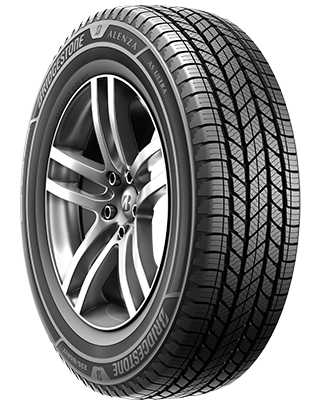
- No warranty
- All-Season
- Light Truck Tires
 Blizzak DM-V2
Blizzak DM-V2
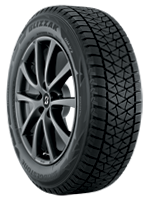
- No warranty
- Winter
- Winter
 Dueler H/P Sport
Dueler H/P Sport
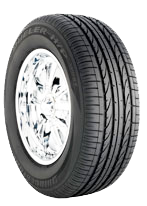
- Platinum Pact Limited Warranty
- Summer
- Light Truck Tires
 Dueler H/T 840
Dueler H/T 840
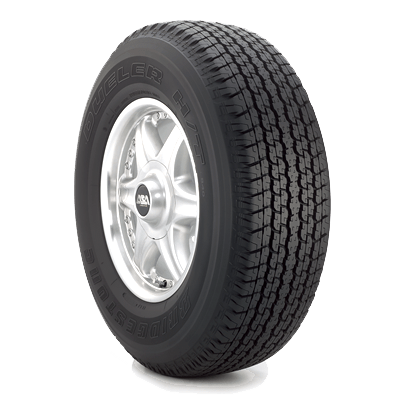
- Platinum Pact Limited Warranty
- All-Season
- Light Truck Tires
 Dueler A/T Revo 3
Dueler A/T Revo 3
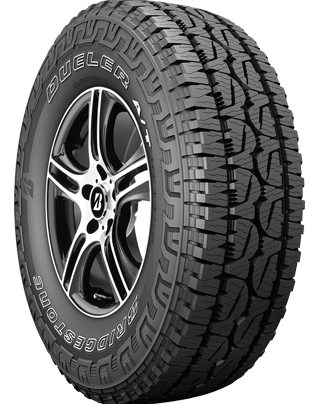
- Platinum Pact Limited Warranty
- All-Season
- Light Truck Tires
 Dueler H/T 684 II
Dueler H/T 684 II
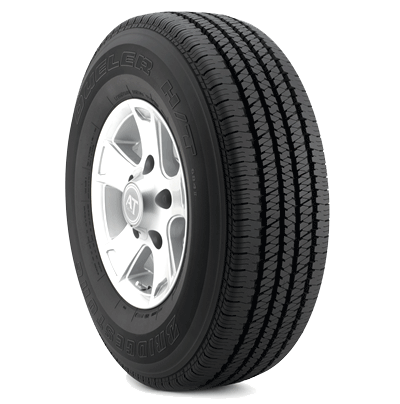
- Platinum Pact Limited Warranty
- All-Season
- Light Truck Tires
 WEATHERPEAK
WEATHERPEAK
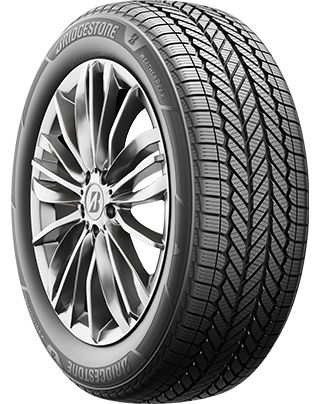
- Platinum Pact Limited Warranty
- All-Season
- Passenger Tires
 Destination A/T2
Destination A/T2
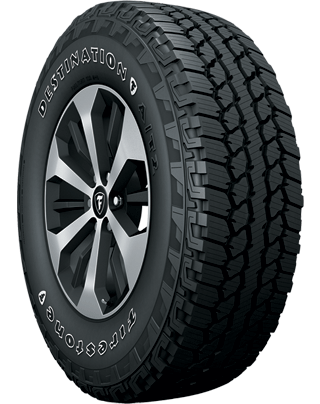
- Gold Pledge Limited Warranty
- All-Season
- Light Truck Tires
 Destination LE3
Destination LE3
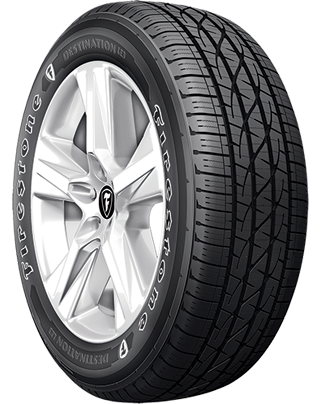
- No warranty
- All-Season
- Light Truck Tires
 Winterforce 2 UV
Winterforce 2 UV
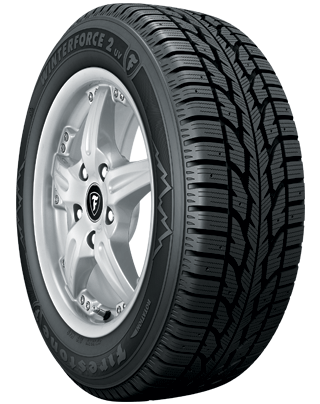
- No warranty
- Winter
- Winter
 Destination X/T
Destination X/T
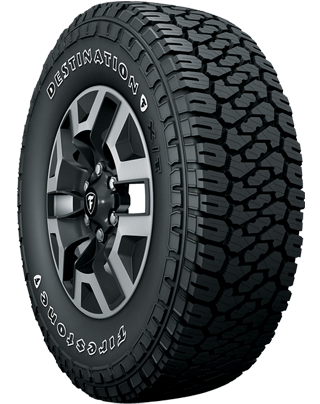
- Gold Pledge Limited Warranty
- All-Season
- Light Truck Tires
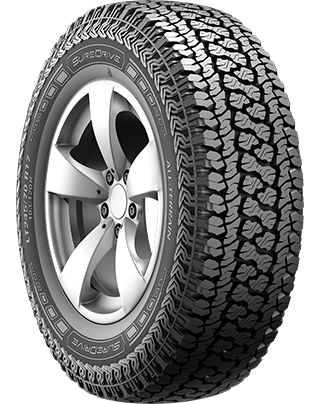
- No warranty
- All-Season
- Light Truck Tires
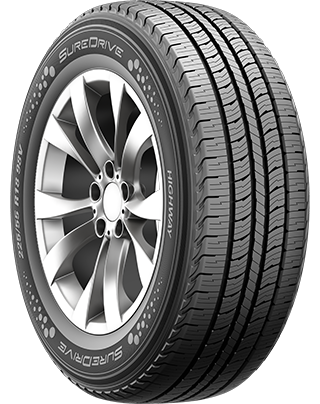
- No warranty
- All-Season
- Light Truck Tires
 PROXES ST III
PROXES ST III
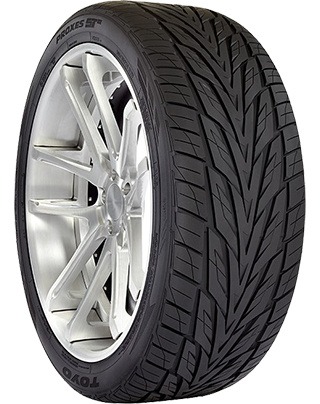
- No warranty
- All-Season
- Light Truck Tires
 OPEN COUNTRY A/T III
OPEN COUNTRY A/T III
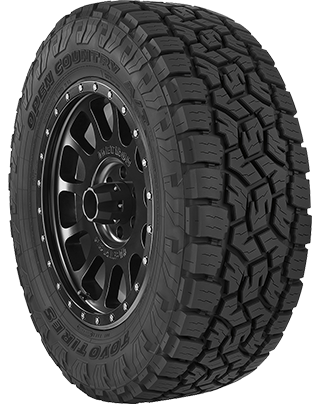
- No warranty
- All-Season
- Light Truck Tires
 OPEN COUNTRY HTII
OPEN COUNTRY HTII
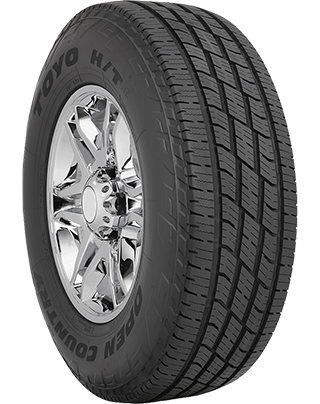
- No warranty
- All-Season
- Light Truck Tires
About 2009 Toyota 4Runner Tires
Other than getting the proper tire size, you also want to think about a couple of other things when getting new Toyota 4Runner tires like where and how you drive, and what tire brand you trust most. When evaluating your driving conditions, think about where you live (countryside vs. city vs. mountains) and the kind of unexpected weather you're likely to experience. Drivers in states that fully experience all four seasons often buy two sets of tires: one set for winter, one set for summer. Other drivers prefer to purchase one all-season set to limit trips to the tire shop and make sure their vehicle is prepared in the rain, sleet, snow, or sun!
Driving style is next on the list to think about when buying tires. If you're a diehard off-roader, you have very different tire needs than a highway commuter who doesn't leave the paved path. Browse Toyota 4Runner tires online or come to your nearby Firestone Complete Auto Care for help selecting the tire that's right for you.
Installing Toyota 4Runner Tires
We sell tires, but we also service them and care for all the around-the-wheel components. We're your tire shop and a complete service center for tire installation, maintenance, repair, rotation, and alignment! We make it easy to buy new 2009 Toyota 4Runner tires online and book an installation appointment at the same time.
2009 Toyota 4Runner Tire Q&A
-
Why check Toyota tire inflation? Even a tiny decrease in tire pressure could impact your safety and fuel economy. Maintaining proper tire pressure can help increase fuel economy, improve braking time, and boost tire lifespan.
-
What do the numbers on my Toyota 4Runner tires mean? Your tire sidewall gives you information about load carrying capacity, speed rating, treadwear, traction, and tire size. Talk to one of our tire technicians to learn how to read the numbers on your tire!
-
Is there an easy way to check Toyota tire tread depth? Stay on top of your tire tread depth to help avoid a dangerous drive. You can check tread depth with a penny. Hold the penny so that Abraham Lincoln is facing you, then place your penny into a tread groove upside down. If you can see the top of Abe’s head, your tread is shallow and it might be time for new Toyota 4Runner tires. Grab a penny. Hold the so that Abe Lincon's head is facing you and his hair is pointing toward the ground. Then, place the penny into a tread groove. If you can see the top of Abe’s head, your tread is shallow and it might be time for new Toyota 4Runner tires.
Repair Services for Your 2009 Toyota 4Runner
When to repair, when to replace? Click on a repair below to learn more about Toyota 4Runner repairs at Firestone Complete Auto Care.
Get Repairs for Your 2009 Toyota 4Runner
No driver looks forward to car repairs. We’re here to change that, though. At Firestone Complete Auto Care, we want to make car repair painless and hassle-free. When it’s time for 2009 Toyota 4Runner repair services, head to your nearest Firestone location and our skilled repair technicians will get your 4Runner back on the road. We'll work to evaluate the scope of repairs needed and explain your options. If a repair isn't necessary, we won't recommend it.
How Much Does Toyota 4Runner Repair Cost?
The cost to repair your 2009 Toyota 4Runner depends on which repairs are needed, the cost of any replacement parts, the labor involved, and where you live. They're updated regularly!
A few different aspects can influence repair costs for your 2009 Toyota 4Runner, like
2009 Toyota 4Runner Auto Repair Q&A
-
Do I still need scheduled maintenance even when nothing is wrong with my Toyota? One of the best ways to prevent 2009 Toyota 4Runner repairs is by staying on top of your Toyota maintenance schedule. This schedule is written by the people who made your vehicle and they know best how to keep it running smoothly.
-
What does it mean to be 'in tune' with your car? You know your vehicle. You also know when something feels 'off' with your vehicle. Pay attention when things don't run like they used to and stop by for a Courtesy Check when you notice an unusual sign, smell, or sensation. We might be able to help you prevent Toyota 4Runner repairs!
-
Why do you recommend certain repairs for my Toyota? Trust is more than just a saying on the wall. It’s a window underneath it. That’s why we won’t recommend services or repairs for your 2009 Toyota 4Runner unless we think they’re vital to your safety on the road.
Get Your 2009 Toyota 4Runner Brakes Fixed
Your Toyota 4Runner engine may be strong and reliable. But if you can’t brake, it might as well be scrap metal. If you notice your brakes are squeaking or not working well, don’t wait! Safe driving is difficult when your brakes are anything but their best. Plus, waiting can lead to more expensive parts wearing out and requiring replacement. Visit Firestone Complete Auto Care for the right brake repair for your 2009 Toyota 4Runner. We offer a variety of brake services like pad/shoe replacement, brake rotor/drum resurfacing, brake fluid exchange, and brake caliper and wheel cylinder service.
Questions About Your Toyota 4Runner Brakes
-
Why does my 4Runner shake when I brake? If your 4Runner shakes when you brake, you could be dealing with warped rotors, faulty brake calipers, worn brake pads or rotors, or loose or worn suspension parts. Schedule a free brake inspection at Firestone Complete Auto Care for help diagnosing your brake issue.
-
How long can I expect my 4Runner brake pads to last? In general, brake pads can last from 30,000 to 40,000 miles. Certain factors, like driving on highways mostly and braking smoothly, can help your brake pads last longer. Hauling heavy loads and riding your brakes can shorten brake pad lifespan.
-
Should my 4Runner be leaking brake fluid when the car is off? Because your 4Runner brake system is a closed hydraulic system, it should not leak brake fluid. However, if components in your brake system have worn out or been damaged, it might cause brake fluid to leak.
2009 Toyota 4Runner Drivetrain Repairs
You don't want to go to just anyone for drivetrain repair. Drivetrains for front, rear, and all-wheel-drive and 4WD vehicles are all different. You want to come see the technicians at Firestone Complete Auto Care. We can fix many 2009 Toyota 4Runner drivetrain components Your Toyota could be crying out for driveshaft repair if you notice vibration as your vehicle accelerates, clunks when shifting, heavy vibrations in your floorboards, or resistance when turning.
Questions About 2009 Toyota 4Runner
-
How do I know if my Toyota drivetrain is damaged? Your Toyota 4Runner drivetrain might be damaged if you notice strange noises from the rear of your vehicle, see fluid leaking, or have issues turning.
-
Why is my 4Runner malfunction indicator light (MIL) on? Engine problems, transmission problems, faulty sensors, electrical issues, misfire issues, and connector problems could all cause your 4Runner’s malfunction warning light, or better known as the check engine light, to illuminate.
-
How serious is a drivetrain malfunction in my 4Runner? If your 4Runner has a drivetrain malfunction, don't wait. Get it checked out by a professional mechanic. Identifying the underlying cause and performing the appropriate repairs right away can help prevent further damage and avoid unsafe driving conditions.
Wheel Alignment for 2009 Toyota 4Runner
With an alignment service, adjustments are made to your Toyota 4Runner’s suspension system, which connects the wheels with the rest of the vehicle. In an alignment service, the individual angles of your tires are adjusted so that they come into contact with the road in just the right way — the way Toyota intended them to. Before we adjust the alignment of your 2009 Toyota 4Runner, we’ll start by checking the current alignment angles. After that, we can adjust your wheel alignment angles until they match Toyota’s recommended measurements.
Answers to Toyota 4Runner Alignment Questions
-
What can knock my Toyota 4Runner out of alignment? Hitting a pothole or curb can alter your wheel alignment. So can general wear and tear over time.
-
How frequently should you get a wheel alignment for your 4Runner? Typically, your alignment should be checked every 6,000 miles or 6 months, whichever comes first. Double-check your 4Runner owner’s manual for Toyota's exact recommended schedule.
-
Do you need an alignment with new 4Runner tires? It’s not mandatory to get an alignment after installing new tires on your 4Runner, but it can be a smart decision! Proper alignment from the jump can help improve handling, fuel efficiency, and tire wear.
2009 Toyota 4Runner Engine Services
When your Toyota 4Runner engine needs repairs, our technicians will provide you with a thorough explanation beforehand. We don't start working until we have your approval. If a repair isn’t urgent right now, we’ll let you know. But if immediate repairs are necessary for your safety, we’ll make sure that's clear, too. We want to give you all the details you need to make an informed decision about your engine repairs. Turn to Firestone Complete Auto Care for your 2009 4Runner engine repairs and you can feel confident knowing that we use Toyota-approved parts and components like the timing belt, engine oil seal, fuses, or other parts.
Questions About 2009 Toyota 4Runner Engines
-
Why does my 4Runner’s check engine light come on when I start it? It's okay if your check engine light comes on when you first start your vehicle. This is a sign that your vehicle is testing its circuits. The light should go off shortly. Bring your vehicle in if it doesn't.
-
Are Toyota 4Runner engine noises bad? Strange under-the-hood noises can point to problems within your Toyota 4Runner engine. Tapping or knocking could mean you need an oil change. Whistling sounds could mean you have an intake leak or misaligned belt. Squealing may be caused by a loose fan belt, and grinding could be a sign that something is wrong with your brakes — not the engine.
-
Are you unknowingly damaging your Toyota 4Runner engine? Certain driving habits can hurt your engine. These habits include driving on an empty fuel tank, revving your engine while the vehicle is in Park, or slamming the gas pedal while the engine is still cold. Steer clear of these habits to help protect engine performance and efficiency.
2009 Toyota 4Runner Tire Repair
If your 2009 Toyota 4Runner is in need of a tire inspection or possible flat tire repair, Firestone Complete Auto Care has your back. In some cases, a tire doesn’t have to be replaced – it can be plugged and patched with a simple repair. Depending on the damage, though, a repair might not be the right move. Our technicians can determine which option is best for your situation. We'll start by evaluating the state of wear, the location of damage, type of damage, and the size of the damage.
If we determine that your 2009 Toyota 4Runner tire can be safely repaired, we’ll get to work on the steps to fix it: (1) Remove the tire from the wheel for inspection and repair, (2) fill in the area that’s been punctured to prevent damage from moisture, and (3) re-seal the inside lining of your tire so that air won’t escape.
Toyota 4Runner Tire Repair Questions
-
How soon should I have my flat tire repaired? Driving on a flat or underinflated tire can put extra stress on your wheels and alignment. While it’s sometimes necessary to drive a short distance on a flat tire to get to a safe place, don’t take any other trips in your 4Runner until you can have the flat tire repaired or replaced.
-
Is temporary sealant bad for my Toyota's tires? Temporary sealants will solve your problem… for a little bit. If you’ve seen temporary or emergency tire sealant before (it usually comes in a can), it can be tempting to turn to this as a solution for your flat tire. Keep in mind that these fixes could buy you some time to get to Firestone Complete Auto Care for a proper repair, but they could also cause some harm in the process (for example, damage to your TPMS). Plus, using a product like this could void your tire warranty.
-
What can cause 4Runner tires to keep losing air? Your 4Runner tires might keep losing air due to a leaking valve stem, puncture or hole in the tire tread or sidewall, or damaged wheel.
Maintenance for Your 2009 Toyota 4Runner
Take care of your Toyota 4Runner and it'll take care of you. With the right maintenance at the right time, your 4Runner has a good chance of hitting 200,000 miles or more.
Guide to 2009 Toyota 4Runner Scheduled Maintenance
Instead of waiting for an issue to arise with your 4Runner, you can stay ahead of problems before they even begin. Just follow your 2009 Toyota 4Runner maintenance schedule! The recommended maintenance schedule is put together by Toyota, your vehicle manufacturer. Driving conditions, climate variations, and other variables can affect which scheduled maintenance services you’ll need; however, there’s a good chance that your vehicle’s recommended maintenance services will include fluid exchanges, filter changes, new brake pads, oil changes, and tire rotations. Staying on track with routine service appointments can help your 4Runner perform better, increase your vehicle safety, and prevent common 2009 Toyota 4Runner problems.
Overview of Essential Toyota 4Runner Maintenance Needs
Bring your 2009 Toyota 4Runner to Firestone Complete Auto Care for factory-recommended maintenance services and our technicians will jump right in with a Courtesy Check. This Courtesy Check can establish a baseline of what may need to be addressed during your service appointment. Every Courtesy Check will include a visual inspection of your 4Runner. We’ll check your head and tail lights, fluid levels, filters, tires (and their alignment!), and windshield wiper blades. We’ll also perform a free battery check to determine your battery’s charge level.
Firestone Complete Auto Care is your one-stop shop for 2009 Toyota 4Runner maintenance and repairs. Don’t wait until something goes wrong with your car. Visit your nearest location for proactive maintenance today.
2009 Toyota 4Runner Maintenance Q&A
-
When should I have Toyota 4Runner alignment checked? Check your car for pothole damage! If you’ve recently hit a pothole (or even if you don’t remember hitting one… they can be sneaky!) check your tire treads, tire sidewalls, and wheels for damage. Potholes can also knock your car out of alignment, so have your alignment checked if you suspect you’ve driven over a rough patch of road lately.
-
When does my Toyota 4Runner need high mileage oil? Do you have more than 75,000 miles on your Toyota 4Runner? If so, request to switch to high mileage oil at your next oil change. This type of oil is specially formulated to keep aging engine parts in the best possible condition.
-
Can I ignore dashboard lights on my Toyota? Because there might be a problem under the hood. Those warning lights are there for a reason! As soon as you notice that one’s illuminated, take your Toyota 4Runner to Firestone Complete Auto Care so you can address any small problems long before they worsen.
Battery Size & Replacement for 2009 Toyota 4Runner
Not sure what battery to get for your Toyota 4Runner?
| Battery | Engine | Warranty | Cold Cranking Amps | |
|---|---|---|---|---|
| 27F-3 | V6/4.0L | Replacement 24 months | Performance months | 710 |
| 24F-6 | V6/4.0L | Replacement 36 months | Performance months | 750 |
| 24F-RP | V6/4.0L | Replacement 48 months | Performance months | 750 |
| 27F-3 | V8/4.7L | Replacement 24 months | Performance months | 710 |
| 24F-6 | V8/4.7L | Replacement 36 months | Performance months | 750 |
| 24F-RP | V8/4.7L | Replacement 48 months | Performance months | 750 |
2009 Toyota 4Runner Batteries
On average, auto batteries last anywhere from three to five years. Check your battery regularly and replace it as needed so it doesn’t leave you and your Toyota 4Runner stranded. Look out for symptoms of a faulty car battery. A slow engine crank, an illuminated check engine light or battery signal, swollen battery case, corrosion-covered posts, or weak lights can all be signs that your battery needs attention.
You can also get a Free Battery Test at your local Firestone Complete Auto Care. Visit us for a complimentary battery check and, if necessary, a battery replacement to help keep your 2009 Toyota 4Runner running! Car batteries are only one of our many strong suits. Our technicians are well-acquainted with Toyota’s service specs for 4Runner car batteries’ reserve capacities and cold cranking amps. Get help identifying the type and size of battery that's best for your 4Runner, and schedule an appointment today for a quick car battery replacement.
Answers to Your Toyota 4Runner Car Battery Questions
-
Why won’t my Toyota 4Runner battery hold a charge? A battery that won't hold a charge is almost as good as dead. The battery might be old. Or, you may have a habit of leaving your car doors open and the lights on overnight. Stop by for a free battery test at your local Firestone Complete Auto Care to learn more about the state of your battery.
-
How long can I expect my car battery to last? A car battery normally lasts three to five years, but this number can vary based on battery type, your driving habits, and battery maintenance.
-
What is the white, crusty stuff around my 4Runner’s battery post? The white, crusty stuff that can accumulate around 4Runner car battery terminals is called corrosion. It is caused by a chemical reaction between the battery acid and the air, which creates a white, powdery substance that can build up on the terminals over time. Corrosion can interfere with the flow of electricity between the battery post and the car's electrical system, sometimes leading to poor electrical performance, difficulty starting, and even premature battery failure.
2009 Toyota 4Runner Oil Changes
Your 2009 4Runner’s oil should be changed according to Toyota’s recommended oil change intervals. Your 4Runner may need an oil change right away if your check engine/oil change light is on, you hear engine knocking, smell oil inside the vehicle, or see an excess amount of vehicle exhaust. You may also need an oil change more frequently than Toyota recommends if you haul heavy loads, drive in dusty terrain, adventure off-road, or drive at low speeds for long distances.
Whether you need high mileage oil, synthetic oil, or conventional oil, you'll find the right 2009 Toyota 4Runner motor oil at Firestone Complete Auto Care. Consult Toyota's recommendations to select the right 2009 4Runner oil and talk with a teammate to learn more about our oil options: Quaker State® Advanced Durability™ conventional oil, Pennzoil® High Mileage Vehicle® motor oil, Pennzoil Platinum® Full Synthetic motor oil with PurePlus™ Technology, and Shell Rotella® heavy-duty engine oil. During your oil change service, an auto technician will change your 4Runner’s oil, replace and recycle your used oil and filter, inspect all of your other filters, top-off important fluids, and perform a courtesy inspection on your entire vehicle. Make an appointment for an oil change service today and let the oil experts take care of your 4Runner's engine.
2009 Toyota 4Runner Oil Change Q&A
-
Why is my Toyota 4Runner oil light illuminated? If you’re overdue for an oil change, it might trigger your Toyota 4Runner oil change reminder light. If the oil pressure light is illuminated, it could be due to low engine oil, a failing oil pump, a malfunctioning oil pressure sensor, or a clogged oil filter.
-
Can I change my Toyota oil on my own? Changing engine oil at home isn’t as simple as it’s made out to be. You’ll have to figure out how to properly dispose of the oil and buy special tools. Having your oil changed professionally can not only reduce the risk of something going wrong during the service, but it’ll also help your car perform smoothly down the road.
-
Why is my Toyota 4Runner exhaust smoke grayish or blue? You could have an oil leak and have a case of burning oil. Looks like it’s time for a professional to take a look. The leak could be the result of worn valve seals, fried piston rings, or old cylinder walls.
2009 Toyota 4Runner Tune-Up & Engine Service
Routine engine tune-ups can bring power back to your 4Runner. Your nearest Firestone Complete Auto Care location has several options to choose from when it comes to Toyota 4Runner engine tune-up services. The first is the standard Firestone Tune-Up. It includes a complete visual inspection of engine components, installation of new spark plugs, and a lifetime warranty on parts*. Another service option pays special attention to the filters in your 4Runner. Specifically, we replace the fuel filter and air filter. The third tune-up option is a fuel system cleaning service, which is a three-step process that removes varnish, dirt, and carbon deposits on your 4Runner's fuel injectors, throttle body, and throttle plate. This can improve your fuel system’s performance (and therefore, your engine’s performance). Consider this when choosing a tune-up service for your 4Runner: your vehicle’s maintenance record and mileage can determine which service is best. Talk to a technician about your driving style, mileage, and service history to learn more about your vehicle's specific needs.
*Talk to a Firestone Complete Auto Care teammate for full terms and conditions on warranties.
Common Engine Tune-Up Q&A for 2009 Toyota 4Runner
-
Will it hurt my Toyota 4Runner to drive with old spark plugs? Replace spark plugs on time or about every 30,000 miles or so. Without the spark of electricity created by spark plugs, your engine doesn’t have the combustion it needs to start — which could leave you stranded on the road. Always replace your spark plugs on time based on Toyota’s recommendations.
-
What should I do if I see leaks under my 4Runner? Don't ignore puddles of fluid under your Toyota 4Runner. It could signal a coolant leak, brake fluid leak, or an oil leak. Let any one of these leaks linger and it could cause engine damage.
-
How often do Toyota 4Runner fuel injectors need to be cleaned? Factors like fuel type and driving conditions can affect how frequently you need to clean your 4Runner fuel injectors. Some manufacturers recommend a fuel system cleaning as part of routine maintenance, or as needed if your vehicle is showing signs of poor fuel system performance.
2009 4Runner Toyota Steering & Suspension Services
During the first few years you had your 2009 Toyota 4Runner, you probably enjoyed a smooth and steady ride. Now, however, things are starting to feel a little rough. Maybe your 4Runner bounces, pulls to one side, or makes an unusual noise when going over a speed bump. The first sign of trouble is the best time to bring your 2009 Toyota 4Runner in for steering and suspension services. We’ll get to the root of the issue and, if your 4Runner suspension system needs repair, we'll explain all of your options and the potential cost.
2009 Toyota 4Runner Steering & Suspension Questions
-
Why does my Toyota 4Runner bounce so much? Excessive bouncing in your Toyota 4Runner might be due to damaged struts or shocks that are unable to absorb road bumps effectively, causing your vehicle to feel more like a pogo stick than a smooth ride.
-
Why does my 4Runner tilt forward when I hit the brakes? The forward momentum and weight transfer to the front wheels during braking can cause your 4Runner's front end to dip forward. A damaged or faulty suspension system may fail to distribute the weight and force effectively, causing the front end to dip even more.
-
What role do tire pressure and tread depth play in my Toyota's suspension? Proper tire care can reduce strain on the suspension system, and also alert you to the need for new tires. Uneven tire wear is one sign of steering and suspension system problems, but it can also contribute to more.
2009 Toyota 4Runner A/C Service Near You
Technicians at Firestone Complete Auto Care are ready to help you address your 2009 Toyota 4Runner A/C problems. During this initial A/C performance check, we’ll look at the state of your 2009 Toyota 4Runner’s A/C system to see if repair work is required. This check includes a visual inspection, performance test, and pressure and leak test.
While your 2009 Toyota 4Runner’s air conditioner is being serviced, we’ll also do an A/C evacuation and recharge. During this process, a technician will remove the old refrigerant from the A/C system. Next, they will evacuate the system according to Toyota's recommendations. Finally, we’ll recharge the A/C system with new refrigerant.
2009 Toyota 4Runner A/C System FAQs
-
Why do I get hot air from my 4Runner A/C? If your car’s air conditioning isn’t blowing cold air at all (or it tries, then turns warm), you could have a clogged expansion valve, a faulty compressor clutch, a leak, or a malfunctioning fuse in the system.
-
How does my A/C system get a leak? A/C system leaks are often due to a combination of age and moisture. Rubber seals and gaskets naturally degrade over time, allowing refrigerant to exit and moisture to enter your 4Runner's A/C system.
-
Why does my vehicle have to be moving for my 4Runner’s A/C to work? A problem with one or more of your air conditioning or electrical system components could cause the A/C to only work when your 4Runner is moving. You may be low on refrigerant, or the cooling fan could be faulty.
2009 Toyota 4Runner Transmission Service & Repairs
The transmission delivers power from the motor to your wheels so that you can drive at your desired speed. Because of the transmission’s responsibility to translate the right dose of power into the right amount of speed, a small transmission issue can put a big dent in your 4Runner’s performance. 2009 Toyota 4Runner transmission issues could include shifting delays, jumping or grinding during acceleration, the car shaking at any speed, or a burning smell or whistling sounds coming from under the hood. If you don’t pay attention to Toyota 4Runner transmission trouble you might notice your fuel economy decrease or discover that your 4Runner’s not even driveable. Our technicians are trained to service 2009 Toyota 4Runner transmission systems according to vehicle manufacturer recommendations. As soon as you suspect something’s wrong with your 4Runner’s transmission, book an appointment at your local Firestone Complete Auto Care to help keep your engine running at peak performance.
2009 Toyota 4Runner Transmission Q&A
-
How often does my 4Runner transmission fluid need to be checked? Maintaining your Toyota 4Runner transmission fluid is one of the best ways to maintain your transmission's health. A general rule of thumb is to have your transmission fluid checked and changed about every 30,000 to 60,000 miles, but that timeline can change if you're hard on your Toyota. Leaks or low transmission fluid are easy to spot and affordable to repair.
-
Can transmission fluid leak from my Toyota 4Runner? Yes. Toyota 4Runner transmission fluid can leak over time and potentially cause transmission issues. Worn or damaged seals, a loose or damaged transmission pan, a cracked transmission housing, faulty transmission cooler lines, or an overfilled transmission could cause transmission fluid leaks.
-
Should I avoid driving my Toyota 4Runner if there is a transmission fluid leak? It’s not advisable to drive your 4Runner if it’s leaking transmission fluid. Your transmission system needs transmission fluid to function properly, and a leak can lead to significant problems, such as overheating or reduced performance. You might even experience transmission failure.
Get a 2009 Toyota 4Runner Vehicle Inspection
At Firestone Complete Auto Care, we perform a multi-point Courtesy Check during any vehicle service. To start, one of our technicians will check the battery in your Toyota 4Runner to see how much charge it has left – and determine if it may fail in the near future. We’ll follow the battery inspection with a visual check of your Toyota 4Runner’s lights, windshield wipers, filters, fluid levels, belts, hoses, tires, and alignment.
We perform a Courtesy Check any time you bring your car to a local Firestone Complete Auto Care for service, but you can also request a Complete Vehicle Inspection for your 2009 Toyota 4Runner if you suspect there may be a bigger problem. A Complete Vehicle Inspection includes everything in a Courtesy Check, plus a thorough manual inspection of your steering and suspension system, brakes, and exhaust components. The goal of this type of inspection is to unearth significant issues that might wreak havoc on your 2009 Toyota 4Runner if left unaddressed.
In some cities or states, you may be able to take care of your state inspection or safety test at your local Firestone Complete Auto Care. These inspections are governed by state automotive laws and may vary in different locations.
Common 2009 Toyota 4Runner Vehicle Inspection Questions
-
When does my Toyota 4Runner need an inspection? It needs a check-up if something feels 'off' to you, the driver. Your Toyota 4Runner could benefit from a Courtesy Check if it has any illuminated dashboard lights, you hear weird noises coming from any part, the engine doesn't start sometimes, or your vehicle pulls to one side.
-
Can you fix my 2009 Toyota 4Runner so it will pass a state inspection test? Don’t panic! Come in for a complete inspection today and we’ll find (and repair) the root cause before you have your vehicle retested.
-
When’s the best time to have a complete vehicle inspection performed on my Toyota 4Runner? The best time to get a complete vehicle inspection for your Toyota 4Runner is before going on a road trip for the peace of mind. Another great time is when something abnormal occurs, and you can't pinpoint the issue. You might notice new dashboard lights, hear strange noises from under the hood, or your steering wheel doesn't feel like it once did.
Radiator Service & Repair for 2009 Toyota 4Runner
Staying on top of routine radiator maintenance for your 2009 Toyota 4Runner is a huge factor in the longevity of your engine. In fact, Toyota recommends replacing coolant/antifreeze at specific intervals, but it’s also wise to keep an eye out for signs of a failing radiator. You could be on the verge of a radiator-induced engine breakdown if you notice leaking coolant, overheating, or an illuminated low coolant dashboard light.
If you bring your vehicle to Firestone Complete Auto Care, we start with a comprehensive inspection of your Toyota 4Runner’s cooling system. We then do a machine-powered radiator exchange, replenish flushed chemicals, sealants, and lubricants, and then pressure check for leaks. When it comes to radiator service and repair, we’ll take excellent care of your 2009 Toyota 4Runner at Firestone Complete Auto Care.
2009 Toyota 4Runner Radiator Q&A
-
What does an illuminated coolant temperature light mean for my Toyota? Pay attention to the temperature gauge and lights on your dashboard. If a low coolant warning light comes on or your dashboard temperature gauge keeps rising, it’s likely that your engine is about to overheat (and could leave you stranded on the road). Wait for the engine to cool down, then have your coolant system checked immediately at your nearest Firestone Complete Auto Care.
-
My 4Runner overheated! What can cause that? Low coolant, a damaged cooling fan, a faulty water pump, a malfunctioning thermostat, or a clogged radiator could all cause your Toyota 4Runner engine to overheat.
-
My 4Runner radiator sounds like it's rumbling or boiling! What's up? Your 4Runner’s cooling system could contain air pockets or your radiator might be clogged. Another possibility is a faulty radiator cap, which is an easy fix!